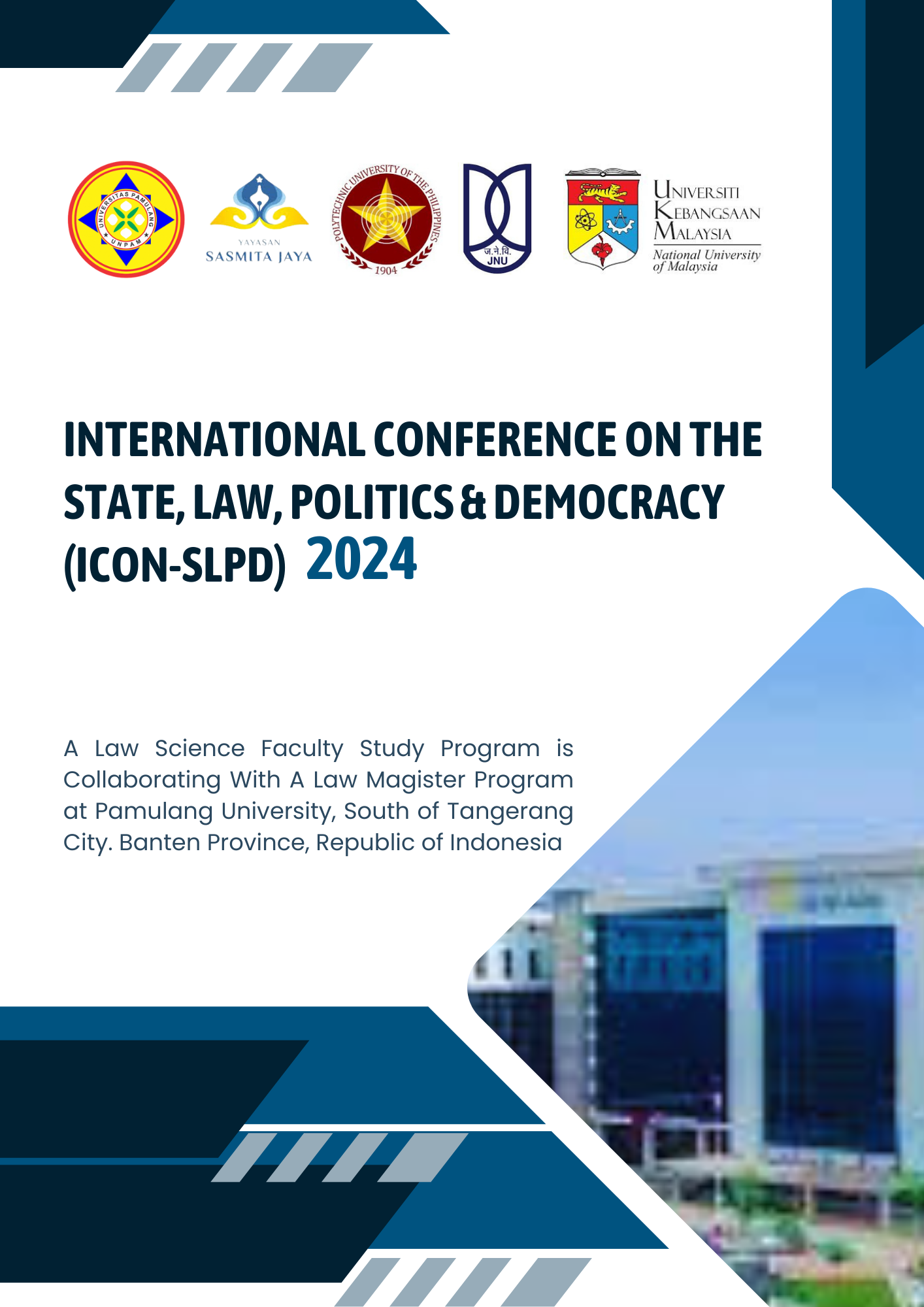The Paradigm of The Principles of Legality in Indonesian Criminal Law is Reviewed From Law Number 1 Of 2023 Concerning the Criminal Law Book
Keywords:
Criminal Law, Principles of Legality, Criminal Law BooksAbstract
Criminal law that adheres to the basic principle of the principle of legality as the basis for imposing a crime as embodied in Article 1 paragraph (1) of Law Number 1 of 2023 of the Criminal Code (New Criminal Code). The expansion of the meaning of the principle of legality can be seen in Article 2 of the new Criminal Code, namely that a person can be prosecuted and punished based on the laws that exist in society (living law) even though their actions are not prohibited by law. This change is aimed at integrating living law as an instrument in achieving substantive justice in Indonesia. This research will examine the application of the principle of legality in Indonesian criminal law and the legal formulation that lives in society in the new Criminal Code. This research uses normative juridical methods and a conceptual approach which is carried out by elaborating on statutory regulations related to living law using concepts, theories and doctrines that have developed in contemporary criminal law scholarship to produce a synthesis that shows the correlation and relevance of these regulations. towards the goal of substantive criminal law reform. The research results show that the Legality Principle is a principle where a criminal act can only be punished if there are regulations that regulate it before the criminal act occurs. The principle of legality was chosen as a perspective because it is the main pillar in the modern criminal law system which guarantees legal certainty. Apart from that, the living legal formulation in the Criminal Code is in accordance with the concept of the principle of legality, which is demonstrated through the process of institutionalization and normatization of customary law in the form of regional regulations. The mechanism for institutionalizing customary law attributed to the National Criminal Code in Government Regulations makes customary law a source of certain norms, but has its own law enforcement procedures carried out by customary law communities.
References
Andri Yanto. (2020). Kamus Ilmiah Populer. Jakarta: CV Bukupedia Indonesia.
Andri Yanto. (2021). Mazhab-Mazhab Hukum: Suatu Pengantar Memahami Dimensi Pemikiran Hukum. Yogyakarta: Segap Pustaka
Andri Yanto, dkk. (2023). Implikasi Resentralisasi Kewenangan Pertambangan Timah Terhadap Potensi Pendapatan Daerah di Bangka Belitung. Jurnal Interpretasi Hukum, 4(2), 344–57, https://doi.org/10.55637/juinhum.4.2.7756
A.C Diala. (2017). The concept of living customary law: A critique. The Journal of Legal Pluralism and Unofficial Law, 49(2), 143 65, https://doi.org/10.1080/07329113.2017.
Barda Nawawi Arief, (2010). “Bunga Rampai Kebijakan Hukum Pidana. Jakarta: PT. Kencana Prenada Media Group, cetakakan kedua
Chadijah, Siti., (2019) “Pengaturan Delik Adat Dalam Rancangan KUHP sebagai bagian dari Ius Constituendum”, Tangerang, Pamulang Law Review.
Johari, dkk. (2023). Kedudukan Asas Legalitas dalam Pembaharuan Hukum Pidana di Indonesia. Cendekia: Jurnal Hukum, Sosial, dan Humaniora, 1(1).
Kartini Mallarangan. (2021). Reconstruction of the Legality Principle: The Essence of the Pancasila Spirit in Criminal Law Reform. Rechtsidee, 8, https://doi.org/DOI:10.21070/jhr.v8i0.782.
Kornelius Benuf dan Muhamad Azhar. (2020). Metodologi Penelitian Hukum sebagai Instrumen Mengurai Permasalahan Hukum Kontemporer. Gema Keadilan, 7(1), https://doi.org/10.14710/gk.2020.7504.
Mahrus Ali, (2012).“Dasar-Dasar Hukum Pidana”, Jakarta: Sinar Grafika.
Mashuril Anwar. (2020). Holistic Paradigm Contradiction of the Ultimate Principle of Remedium Against the Principle of Legality in Environmental Criminal Law Enforcement. Administrative and Environmental Law Review, 1(1), https://doi.org/10.25041/aelr.v1i1.2083
Moeljatno. (2002). Asas-asas Hukum Pidana. Jakarta. PT Rineka Cipta.
Moeljatno, (2015).”Asas-Asas Hukum Pidana”, Jakarta: Rineka Cipta, Cet. IX. 5.
Monang Siahaan, (2016).“Pembaharuan Hukum Pidana Indonesia”. Jakarta: Grasindo
Muhammad Zakaria Wirabakto. (2022). A Juridical Analysis of the Comparison of Legality Principle in the Indonesian Criminal Code (WvS) and the Draft of New Indonesian Criminal Code (National Criminal Code). Budapest International Research and Critics Institute Journal 5(1), 3030–40, https://doi.org/DOI: https://doi.org/10.33258/birci.v5i1.3946.
Muladi, (2005) “Lembaga Pidana Bersyarat”. Bandung: Alumni, cetakan ketiga.
M. Karfawi, (1987)“ Asas Legalitas dalam Usul Rancangan KUHP (Baru) dan Masalah-masalahnya.” Jurnal Arena Hukum.
Nella Sumika Putri. (2021). Memikirkan Kembali Unsur ‘Hukum Yang Hidup dalam Masyarakat Dalam Pasal 2 Rkuhp Ditinjau Perspektif Asas Legalitas. Indonesia Criminal Law Review, 1(1).
Nurlaila Isima. (2022). Urgensi Pengakuan Hukum Yang Hidup Pada Masyarakat Dalam Asas Legalitas Ditinjau Dari Perspektif Sosiologi Hukum. Jurnal Interdisiplin Sosiologi Agama, 2(1).
N Amalia, dkk. (2018). Adat Court Judge: Tradition and Practice of Dispute Resolution Between Societies in Aceh. Journal of Law, Policy and Globalization, 77(11).
Prayitno, Bastiaji. dan Cecep Miptahudin, (2021). “Kepastian Hukum Akta Perdamaian Yang Dibuat oleh Notaris Dengan Mengesampingkan Perbuatan Tindak Pidana”, Tangerang: Pamulang Law Review, Volume 4.
Pusat Kajian Hukum Adat “Djojodigoeno’ (2020) Fakultas Hukum Universitas Gajah Mada dan Koalisi Masyarakat Sipil Tolak Living Law, “Brief paper: ‘Hukum Yang Hidup’ Dalam Rancangan Undang-Undang Kitab Undang-Undang Hukum Pidana”, Jakarta.
Roelof H. Heveman. (2002). The Legality of Adat Criminal Law in Modern Indonesia. Jakarta. Tata Nusa.
Soerjono Soekanto dan Sri Mamudji. (2003). Penelitian Hukum Normatif : Suatu Tinjauan Singkat. Jakarta: PT. RajaGrafindo Persada.
Vincentius Patria Setyawan. (2021). Asas Legalitas dalam Perspektif Filsafat Hukum. Justitia et Pax, 37(1), https://doi.org/10.24002/jep.v37i1.3276.
Vincentius Patria Setyawan. (2023). Pemaknaan Asas Legalitas Materiil dalam Pembaruan Hukum Pidana Indonesia. Gudang Jurnal Multidisiplin Ilmu, 1(1), https://doi.org/10.59435/gjmi.v1i1.3.
Yehezkiel Genta. (2019). Reinterpretasi Makna Asas Legalitas sebagai Bentuk Pengakuan Hukum Pidana Adat dalam Upaya Menjamin Hak Asasi Masyarakat Adat. Padjadjaran Law Review, 7(1).





